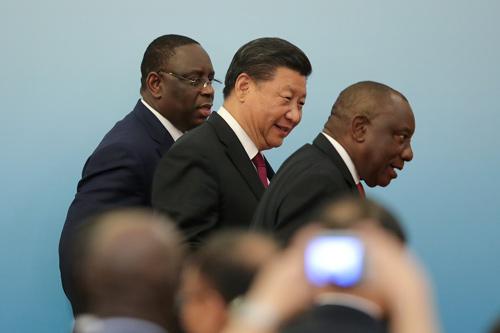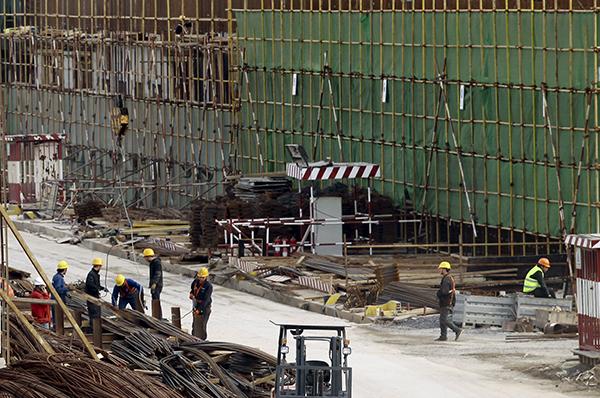You are here
China-Africa summit rejects debt criticism
By AFP - Sep 04,2018 - Last updated at Sep 04,2018

Chinese President Xi Jingping with South Africa's President Cyril Ramaphosa and Senegal's President Macky Sall attend the 2018 Beijing summit of Forum on China-Africa Cooperation joint news conference at the Great Hall of the People in Beijing, China, on Tuesday (Reuters photo)
BEIJING — Chinese and African officials on Tuesday rejected criticism of Beijing's debt-laden overseas development projects as they wrapped up a summit that included a new $60 billion assistance pledge for the continent.
President Xi Jinping hosted leaders from across Africa amid criticism that his country's Belt and Road global trade infrastructure project is worsening debt problems in some countries.
"Everything we do with China is perfectly under control, including on the financial and debt side," said Senegal's President Macky Sall, whose country took over the co-chairmanship of the Forum on China-Africa Cooperation (FOCAC) for the next three years.
"We shouldn't let our conscience be disturbed by criticism made regarding the nature of our relations with China," Sall said in remarks alongside Xi and South African President Cyril Ramaphosa to close the triannual FOCAC summit.
Xi said the summit "opened a new chapter in the history of China-Africa relations".
Ramaphosa, who handed over the co-chairmanship to Sall, said another achievement at the summit was an agreement to "work hard to increase Africa's value-added exports to China".
He had called on Monday for the two sides to work to "balance" trade relations, noting that Africa exports raw materials to China while Chinese factories send finished products back to the continent.
'Vanity projects'
Xi opened the meeting on Monday with an offer of $60 billion in funding for projects over the next three years, saying there were "no political strings attached" but warning against spending on "vanity projects".
Xi also said China would write off the debt of some of the poorest African countries, without specifying which.
The money comes on top of $60 billion offered at the last summit in 2015.
China's special envoy for African affairs, Xu Jinghu, said Beijing would be "very conscientious" in its cooperation with Africa and conduct feasibility studies before choosing projects.
"China has not increased the debt burden of Africa," she told reporters.
"The reasons behind the African debt are quite complex. It has been accumulated for a long time," Xu said, adding that the prices of raw materials exported by Africa have fallen and reduced countries' revenues.
"There are many countries in Africa. Even for the countries that are heavily indebted, China is not the main creditor. So it doesn't make sense and it's groundless to put the blame on China for the African debt," she said.
The new financing includes $15 billion in grants, interest-free loans and concessional loans, $20 billion in credit lines, the creation of a $10 billion fund for development financing and a $5 billion special fund to pay for imports from Africa.
Chinese companies were encouraged to invest at least $10 billion on the continent.
Johan Burger, director of the NTU-SBF Centre for African Studies at Singapore's Nanyang Technological University, said Xi's warning against vanity projects showed the "severity" of the issue.
"Should this money be spent on vanity projects, it will lend credence to the charges against China," Burger said.
"China itself does not have an [a] never-ending source of funding, and would not want to see its financing be wasted, with no returns for itself and no real benefit for the countries involved."
Related Articles
BEIJING — Chinese leader Xi Jinping on Thursday pledged over $50 billion in financing for Africa over the next three years, promising to dee
ALGIERS — Algeria is turning to China to finance several infrastructure projects, including a new $3.2 billion port, as the North African co
NAIROBI — The United Arab Emirates announced on Tuesday $4.5 billion in clean energy investments in Africa during a landmark climate summit



















